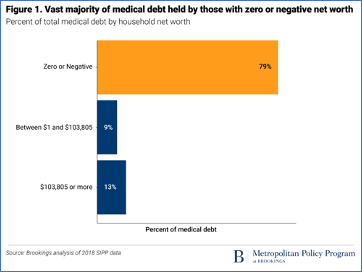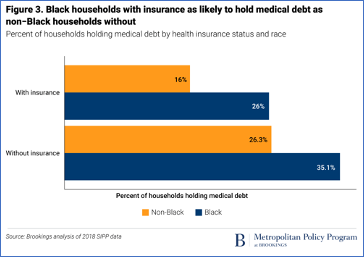Racism in health – medical debt
October 11, 2021
Summary: “Columbus Day” is a holiday that invites us to reflect on another source of pervasive racism in our health system – the debt that arises when health insurance is absent or inadequate. This problem would be resolved with, yes, single payer.
The racial implications of medical debt: How moving toward universal health care and other reforms can address them
Brookings Institute
October 5, 2021
By Andre M. Perry et al.
17.4% of households with insurance have medical debt compared to 27.9% of households without insurance. Conditional on having medical debt, households with health insurance have an average of $18,827.25, while households without health insurance have an average of $31,947.87.
[R]oughly half of all collections tradelines are due to medical bills, affecting nearly one in five consumers in the credit reporting system. … In 2007, at least 62% of bankruptcies were, at least partially, attributable to medical debt. Even after the advent of the Affordable Care Act in 2010, that number has not decreased significantly.
Twenty-seven percent of Black households hold medical debt compared to 16.8% of non-Black households.


Comment by: Jim Kahn
Today is still officially designated “Columbus Day” despite the racist implications of naming the “discovery” of this continent for a European who arrived to find inhabitants already quite aware of its existence. Thus started racism in our land.
Racism permeates our systems. Recently I wrote in HJM about two reports on racism in health. In this post I add a third: medical debt.
The Brookings Institute examined census data and found that medical debt rates are far higher among Blacks than Whites. This is related to a greater chance of being uninsured, but even insured Blacks are as likely as uninsured whites to hold medical debt.
Who’s got this medical debt? Almost entirely people with zero or negative net worth. Not people who can afford it.
How much do they have? A mean of $20,500, a median of $2000.
The racism links work, in part, like this:
- Blacks were historically shunted to occupations and jobs that paid less.
- Blacks were deprived of government subsidies, such as federally insured mortgages.
- Black families thus have a net worth about one-tenth that of whites.
- The jobs Blacks hold are less likely to provide health insurance.
- Safety net insurance like Medicaid is very restricted and stingy in many states.
- Blacks are left with poor access to health care and more medical debt, which they can’t afford.
- Financial barriers to healthcare cause serious health consequences.
The Brookings authors mention single payer as one potential solution to these problems. We think single payer is the only reasonable option that meets their own prescription that “American health insurance systems need a radical restructuring”.
You might also be interested in...
Recent and Related Posts
Premier Medical Journal Scrutinizes Corporatization of US Health Care
Laying out the Ill-Effects of Medicaid Cuts in the Congressional Budget Bill
